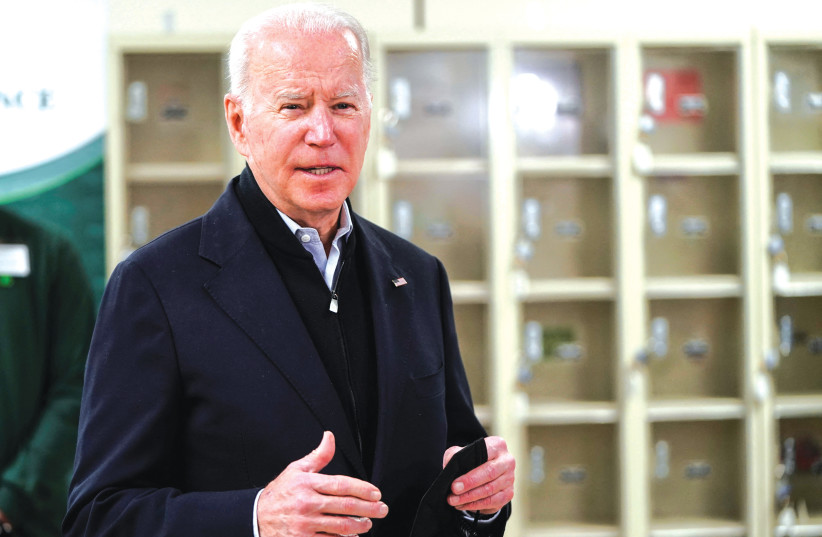US President Joe Biden accepted Israel’s freedom to act even if world powers reach a nuclear agreement with Iran, Prime Minister Naftali Bennett said Monday, a day after the two leaders spoke on the phone.
“Freedom of action” was not mentioned in the context of Iran in the White House readout of the call, which was released late Sunday night.
“President Biden conveyed his unwavering support for Israel’s security and freedom of action, emphasizing his administration’s full support for replenishing Israel’s Iron Dome system,” the statement said.
However, most of the phone call was about Iran and the nuclear negotiations in Vienna, including discussion of Israel’s freedom of action, Bennett said in a press briefing Monday morning.
“Our stance is known,” he said. “I have expressed it a number of times and new aspects of it yesterday... I was happy that he clarified explicitly that Israel will maintain its freedom to act in any situation, which is true, whether or not there is a deal... It’s important in relation to Iran.”

The phone call came as negotiating teams headed back to Vienna for the continuation of the eighth round of talks on Tuesday.
The US and Iran are indirectly negotiating their return to the 2015 Joint Comprehensive Plan of Action, which was meant to keep the Islamic Republic a year away from nuclear breakout, restricting – but not banning – its uranium enrichment and stockpiling while gradually lifting sanctions until 2030.
The US left the deal in 2018 – citing Iran’s proxy warfare and other malign acts in the Middle East and hiding of parts of its nuclear program when entering the JCPOA – and placed “maximum pressure” sanctions on the regime. Iran has far surpassed the deal’s limitations, enriching uranium to 60% purity; weapons-grade uranium is 90% enriched.
“An agreement where sanctions forming the maximum pressure are not lifted cannot be a good agreement,” Iranian Supreme National Security Council Secretary Shamkhani said Monday.
US Special Envoy to Iran Rob Malley admitted in recent days that even if the sides agree to return to JCPOA, Iran’s breakout time will be far shorter than it was in 2015.
Israeli officials are concerned about a breakout time that will be too short and that there is little time left to the JCPOA. In three years, the snapback sanctions in case of Iranian violations of the deal expire, which means Iran will be able to install as many advanced centrifuges as it wants.
“The danger in returning to the nuclear deal and losing the tools for the US to force a ‘longer and stronger’ agreement, as the Americans call it, is imminent,” National Security Adviser Eyal Hulata said.
“We need to prepare for every scenario, whether there is a return to the agreement or not,” he added.
Hulata is set to depart for Washington on Tuesday to meet with American National Security Advisor Jake Sullivan and continue discussions about Iran.
“We don’t see eye-to-eye with the Americans on every issue, but the coordination is deep, important and strategic,” he said, adding that he speaks with Sullivan almost daily.
The government has shifted Israel’s approach and goals when it comes to Iran, from not only focusing on the nuclear threat but also on broader actions, a senior diplomatic source said.
“We are in a long, consistent and multidimensional campaign to weaken Iran,” the source said. “Its weakening comes first in the economic dimension through numerous actions – economic, diplomatic, preventative, secret and open, in cyber and other areas.”
Israel’s goal is “to bother them at home, so that they will be busy with themselves,” much like how Iran funds Palestinian Islamic Jihad, Hamas and Hezbollah on Israel’s borders, the source said, adding: “They should get weaker and have less money and energy. The campaign will be long and will not end in one or even two years.”
Opposition leader Benjamin Netanyahu on Monday said Iran “is in advanced negotiations to return to the nuclear deal. Amazingly, Israel’s stance is not heard on this matter.”
“Bennett isn’t fighting against Iran’s return to the agreement, and Foreign Minister [Yair] Lapid is silent like a fish,” he said in the Knesset.
Referring to the Biden administration’s recent decision to waive some sanctions on Iran’s research reactor, Netanyahu said the US and the West are giving Iran “free gifts, while Iran is racing toward an agreement that will allow Iran to enrich uranium.”
